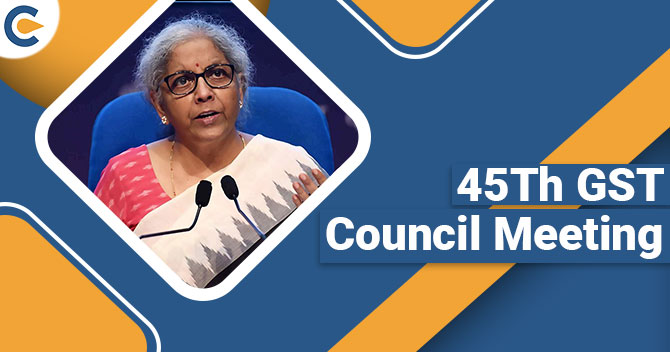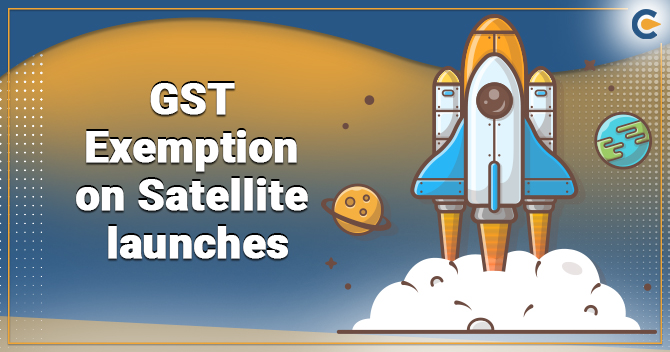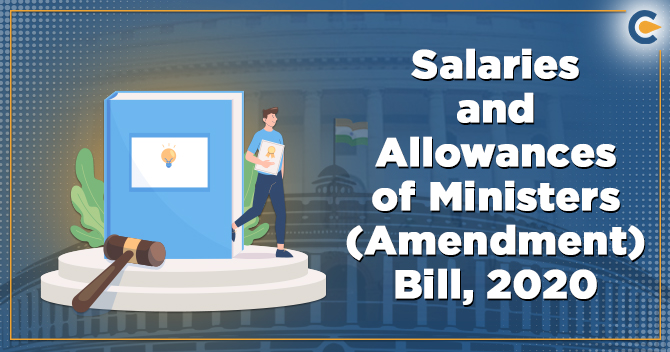The 45th GST Council Meeting was conducted on September 17, 2021, and was presided over by Honourable Finance Minister Smt. Nirmala Sitharaman. The aforementioned meeting was held at Lucknow, U.P. The meeting was participated by MOS Shri Pankaj Chaudhri, as well as Finance Ministers from the states and UTs, as well as senior officers from the Union Government and the states. It is also worth noting that it was the first face-to-face meet in the previous 2 years. Let’s take a look at the results of the 45th GST Council Meeting, which was held on September 17, 2021.
Concessions on Specific Medications
- Until December 31, 2021, the GST Council has extended the concessions on all COVID 19-related designated medicines. Nevertheless, during the 45th GST Council meeting, the Finance Minister emphasised that this extension only applies to medications and not to other COVID 19-related medical equipment.
- Expensive Zolgensma and Viltepso, two drugs used to treat muscle atrophy, are now included in the GST exemption list. They are regarded as life-saving medications. In addition, any such medication imported for personal use is exempt from IGST.
- Drug reductions for COVID-19 therapy have been extended until December 31, 2021, including Amphotericin B (nil rate), Remdesivir (5% rate), Tocilizumab (nil rate), and anti-coagulants such Heparin (5% rate). Itolizumab, Posaconazole, Infliximab, Favipiravir, Casirivimab & Imdevimab, 2-Deoxy-D-Glucose, Bamlanivimab, and Etesevimab have all been added to the list of medications now subject to a 5% GST. Equipment is not eligible for this extended respite.
- In addition, the GST council has reduced the tax rate for cancer-related medications from 12% to 5%.
- The GST rate for RetroFit kits for handicapped people has been decreased to 5%.
GST to be paid by Zomato and Swiggy
- In the 45th GST Council Meeting, according to the final pronouncement and recommendation of the fitment committee, two prominent food delivery apps, Zomato and Swiggy, would be obliged to pay GST starting January 1, 2022. The software has been given until January 2022 to make modifications.
Service taxes will be levied on E-commerce Operators
E-Commerce businesses will be required to pay tax on the key services performed via them from January 1, 2022, as discussed in the 45th GST Council Meeting:-
- Passengers will be transported by any form of motor vehicle across it from January 1, 2022.
- With a few exclusions, services at restaurants will be delivered through it from January 1, 2022.
- Goods exported by vessel and air are free from GST until September 30, 2022.
- The National Permit Fee for giving permits to goods carriages to function across India and its neighbouring states is now GST-free.
The GST regime will not apply to petroleum and diesel
- The council has agreed that petroleum and diesel will not be subject to the GST regime. States were adamantly opposed to the fuels’ inclusion, citing worries about revenue stability throughout the 45th GST Council Meeting.
- If petroleum and diesel are brought under the GST framework, pricing would become more consistent across the states, since the various excise and VAT rates imposed by the Centre and the states will be eliminated.
- This would significantly lower diesel and petroleum pricing, which have just reached new highs.
Reduced GST on Fortified Rice
- It has been proposed that the GST rate on fortified rice kernels for schemes such as integrated child development programmes be decreased from 18% to 5%.
Other Significant Aspects of the 45th GST Council Meeting
- The GST rate on biodiesel sold to oil marketing businesses has been lowered from 12 percent to 5%.
- Training programmes for skill development that are fully or partially financed by the federal and state governments are GST-free. GST exemption would be granted to programmes in which the federal government or a state government covers at least 75% of the cost of training.
- To minimise double taxes, airplanes and other items on lease are now excluded from IGST. Customs legislation will also be amended when necessary. Lessors in SEZs who pay GST as an advance charge are also excluded.
- In the case of mining concentrates and specified metals, the inverted tax structure caused by the royalty utilised as input services, which were taxed at 18% GST, has already been addressed, although no timetable for implementation has been set.
- Specified renewable energy devices with current inputs of 5% have inputs charged at 18%. As a result, changes have been implemented. On such energy equipments, a 12% GST charge has been imposed, assisting domestic production and the government’s Aatmanirbhar Bharat Mission.
- To rectify the inverted tax structure, the GST on railway parts and locomotives falling under Chapter 86 was raised from 12% to 18%.
Clarifications on the GST rate on goods and services discussed in the 45th GST Council Meeting
| GOODS / ITEMS | GST RATE |
| Henna powder and paste are both 100% natural having no additives | 5% |
| BSG (Brewers’ Spent Grain), DDGS (Dried Distillers’ Grains with Soluble), and other residues that come under HS code 2303 | 5% |
| Reagents for laboratories and other items coming under category 3822 | 12% |
| Heading 2106 includes scented sweet supari as well as flavoured and coated Elaichi. | 18% |
| Pens of all sorts and their parts (This correction will remove the inverted tax issue). | 18% |
| Carbonated Fruit Beverages of Fruit drinks and carbonated beverages containing that includes fruit juice. | 28% & CESS 12% |
| Tamarind seeds are classified as 1209. | Seeds used for sowing are exempt; otherwise, subjected to 5%. |
| External batteries sold in conjunction with UPS systems/inverters. | Other than lithium-ion batteries, 28% |
| UPS/ Inverter | 18% |
| Containers made of paper and paperboard, either corrugated or non-corrugated | 18% |
| Dried & Fresh Nuts | 5% / 12% |
| Pharmaceutical items classified as heading 3006 | 12% |
| SERVICES | GST RATE |
| Coaching services for students are offered by coaching institutes and non-governmental organisations (NGOs) under the central sector programme of “Scholarships for Students with Disabilities.” | Exempted |
| Cloud kitchen/central kitchen services are now classified as ‘restaurant service.’ | 5% |
| Ice Creams by Parlours | 18% |
| Overloading fees at toll plazas | Exempt |
| The term “giving on hire” currently refers to the renting of cars by state transportation companies and municipal governments. | Exempt |
| Mineral exploration and mining rights are granted. | 18% |
| Admission to amusement parks, rides, and so forth. | 18% |
| Admission to casinos establishments | 28 |
| For the item prescribing the 5% GST rate on job work services in regard to food and food goods, alcoholic liquor for human usages is not food and food products. | N.A. |
Compensation Cess Decision
A presentation was presented to the Council on the compensation scenario, in which it was stated that the funds collected from the Compensation Cess in the period beyond June 2022 to April 2026 would be used to repay borrowings and debt servicing undertaken to bridge the gap in 2020-21 and 2021-22. Numerous possibilities, as proposed by various committees/forums, were given in this respect.
The Council debated the subject for quite some time. The Council resolved to establish a GOM (Group of Ministers) to look into the problem of correcting inverted duty structures for footwear and textile industry anomalies, which would begin on January 1, 2022; rationalise the rates and evaluate exemptions from GST from the standpoint of revenue augmentation. This was also decided to form a Group of Ministers to discuss ways to use technology to enhance compliance, such as monitoring via enhanced e-way bill systems, e-invoices, and FASTag data, as well as strengthening the institutional framework for intelligence sharing and coordinated enforcement actions between the Centre and the States.
Recommendations on GST laws and process in the 45th GST Council Meeting
- As part of a trade facilitation initiative, the obligation to file Form GST ITC-04 has been relaxed. Taxpayers with an annual aggregate turnover of more than Rs.5 crore in the previous financial year can submit Form ITC-04 once every 6 months. ITC-04 is available to taxpayers with a yearly aggregate turnover of up to Rs. 5 crore in the previous fiscal year.
- Interest is only to be imposed on the net cash liability under GST, according to a prior Council resolution. Section 50 (3) of the CGST Act will be changed retroactively, effective July 1, 2017, to require a taxpayer to pay interest on “ineligible ITC availed and utilised” rather than “ineligible ITC availed.”
- The unutilized amount in the CGST and IGST cash ledgers can be transferred between different individuals (i.e., businesses with the same PAN but registered in different states) without having to go through a refund process. There are certain protections in effect to the same.
- To eliminate uncertainty and legal conflicts on different topics, the following circulars will be issued:-
- The definition of “intermediary services” should be clarified;
- Clarification on the interpretation of the phrase “merely establishment of distinct person” in condition (v) of Section 2 (6) of the IGST Act 2017 for the export of services.
- As per Section 77(1) of the CGST and SGST Acts, and Section 19(1) of the IGST Act, the CGST Rules will include a provision to clarify the method and time limit for filing a refund for tax wrongly paid.
Efforts to improve compliance
- A taxpayer[1] must have their Aadhaar authentication of registration in order to make a refund claim or an application for revocation or cancellation of registration.
- Late penalties for late submission of Form GSTR-1 would be auto-populated and collected in Form GSTR-3B, the following open return.
- GST refunds would be paid to the bank account associated with the PAN used to acquire GST registration.
- With effect from January 1, 2022, Rule 59(6) of the CGST Rules will be changed to stipulate that registered individuals will not be allowed to file Form GSTR-1 if they have not filed their previous month’s return in Form GSTR-3B.
- After the proposed clause (aa) of Section 16 (2) of the CGST Act is announced, Rule 36(4) of the CGST Rules shall be modified. It would limit the amount of ITC available for invoices/debit notes to the degree that the respective suppliers provide the invoice/debit note data in Form GSTR-1/IFF. Moreover, they must also be reported to the taxpayer on Form GSTR-2B.
*The rate adjustments and exemptions listed above are applicable as of the CBIC notification.
Hopefully, this blog was useful. View the PDF of the 45th GST Council Meeting Recommendations for further insights.
PRESS_RELEASE_45Read our article:Casting light on the Changes in GSTR-9C for FY 2020-21











